South Africa. The most crucial election since the end of apartheid.
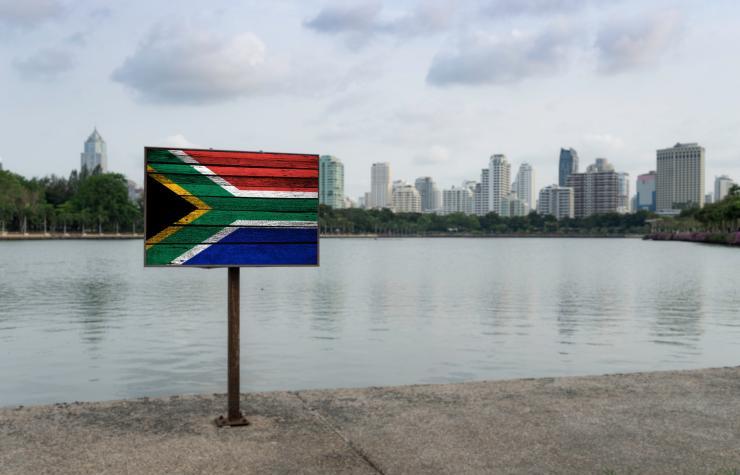
Thirty years after Nelson Mandela’s election, South Africa will hold the most crucial ballot in a context where the ruling ANC might lose its absolute majority. Several scenarios of coalition.
Almost all opinion polls since last October predict that the forthcoming election scheduled for the next 29 May will mean the end of the ruling African National Congress’s absolute majority for the first time since 1994 and force it to form a coalition.
Support for the ANC is indeed expected to drop somewhere between 39% and 48%, from 57% in 2019. According to a Social Research Foundation poll, the support for the main opposition party, the White-led centre-right Democratic Alliance (DA) increased from 24% in March 2023 to 31% last October.
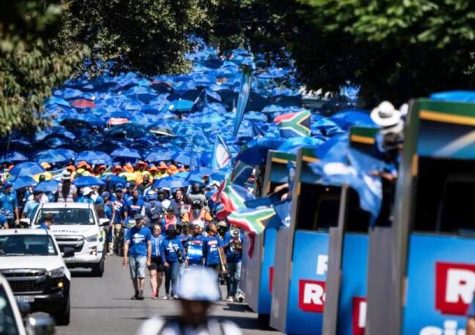
DA supporters march to the Union Buildings for the DA National Manifesto Launch. Photo:DA
The challenge posed by the DA led by John Steenhuisen, is strengthened by the coalition it has formed with 10 other parties: the Multi-Party Charter (MPC) which may get up to 38 percent of the vote, according to the most optimistic forecasts. This coalition includes the DA, the United Independent Movement, the Freedom Front Plus, the Inkatha Freedom Party (IFP), the African Christian Democratic Party, ActionSA, the Spectrum National Party and the Independent South African National Civil Organisation.
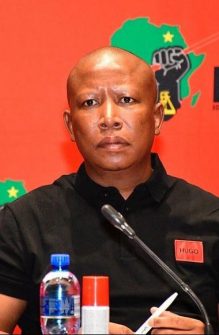
Julius Malema leader of Economic Freedom Fighters (EFF) party. He can get between 12% and 16% of the vote. Instagram
According to various polls, the radical leftist Economic Freedom Fighters (EFF) party founded in 2013 by former ANC Youth League leader Julius Malema, would get between 12% and 16% of the vote and remain the third largest party by “stealing the ANC’s mantle”, as says political scientist Ongama Mtimka of Nelson Mandela University.
In Kwazulu-Natal, part of the ANC vote has gone to another dissident force: the newly formed uMkhonto WeSizwe (MK) party, named after the former armed wing of the ANC, the Spear of the Nation and supported by former President Jacob Zuma. The MK party which snatched votes from the ANC in this province at the 2021 by-elections, poses “a direct challenge to Ramaphosa’s leadership”. In endorsing the party, Zuma indeed not only challenges the ANC politically but also claims its heritage. The MK party also formed in January 2024 a coalition with the African Congress for Transformation, created by former ANC Secretary General Ace Magashule, following his expulsion from the party for misconduct. The Social Research Foundation survey also found that five of SA’s nine provinces (Gauteng, KwaZulu-Natal, Free State, Western Cape and the Northern Cape) could be run by coalition governments after the elections.
Declining popularity
The collapse of the confidence in the ANC is the combination of various factors. One is unemployment which the DA plans to fight with the creation of two million jobs. Daily power cuts which affect badly households and businesses, the cost of living, crime and poverty are the other issues in a climate of growing xenophobia exploited by one member of the Multi Party Charter coalition, Action SA which promotes strict immigration policies.
According to the Africa Centre for Strategic Studies, the ANC’s declining popularity is attributed to perceptions of growing corruption within the party. South Africa ranks 72nd out of 180 countries on Transparency International’s corruption perception index. TI also reminds a series of corruption scandals involving the former and incumbent presidents. Former President Zumla was jailed in 2021 for contempt of court after refusing to testify about corruption under his presidency
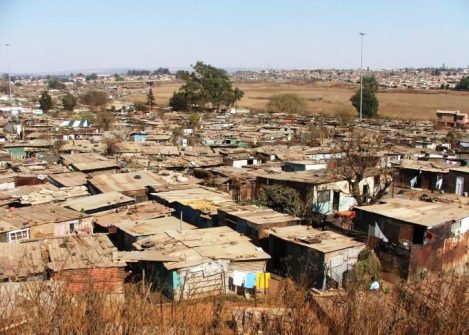
View of Soweto. South Africa is one of the most unequal countries in the world. File archive
A report completed by Chief Justice Raymond Zondo in 2022 revealed that one hundred ANC party members including the first deputy secretary-general, Nomvula Mokonyane were involved in corruption. The ANC has been increasingly vulnerable to state capture (control over government decision-making by the private sector or external actors), namely through the influence of the Gupta brothers’ network of private interests within the Zuma administration.
The ANC which has been ruling South Africa for 30 years is also held responsible for the growing inequality in a country where whites still own 72 percent of the land and is considered by the World Bank as the “most unequal” in the world. The poverty and the magnitude of youth unemployment which hits over 60 percent of 15- to 24-year-olds and 32 % of the population has largely contributed to the growing popularity of the Economic Freedom Fighters who call for state-provided housing, nationalisation of mines and land redistribution.
High levels of crime
Sandy Africa, associate professor of politics at the University of Pretoria speaks of a “mood of despair” over high levels of crime and violence and “widespread frustration” over crumbling infrastructure and poor service delivery. The murder rate of 45 per 100,000 is the fifth highest in the world, after those of Venezuela, Papua New Guinea, Afghanistan and Haiti. Political violence is endemic. Twenty councillors were killed in KZN in 2023. The police say most of the dead are victims of political battles, often linked to factional infighting within the ANC.
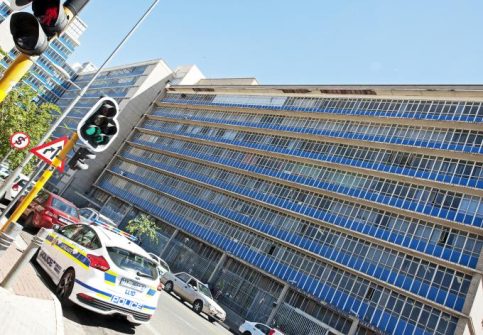
Police HQ, Johannesburg. Istock/pilesasmiles
Assuming that the ANC will not achieve an absolute majority, there are several scenarios of coalition. Some predict that if the ANC does win slightly less than half the vote, potential partners may include the GOOD party, whose leader Patricia de Lille serves currently as tourism minister in the government, or other small parties like the Patriotic Alliance and Al Jama-ah.Should the gap be wider, then the ANC may have to choose between the centre-right Multi-Party Charter coalition or the EFF to obtain the majority it needs to rule the country.
The ANC is divided between those who prefer the MPC as a partner and those who prefer the EFF.
The EFF has a difficult relationship with President Cyril Ramaphosa but has co-ruled with the ANC in several municipalities. Dr Seelan Naidoo, principal associate at Public Ethos Consulting considers that in the scenario of the lowest performance by the ANC and the highest performance by a DA-led coalition and by the EFF, the only way to form a national government would be through an ANC-EFF coalition. In such event, however, there could be a continuous policy tussle between the ANC and EFF and over executive positions immediately after the election. But such scenario could be unstable politically.
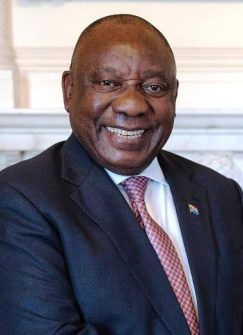
The president of South Africa, Cyril Ramaphosa. Differences between the foreign policies of the three main parties. Photo: Foreign Office UK
Some analysts also suspect that to keep the MPC out of power after the elections, the ANC would go as far as forming a coalition with the MK Party as an alternative or jointly with the EFF. The scenario of an ANC-MPC coalition though more comfortable arithmetically looks less likely because of the gaps between both in terms of policy.
At any rate, the South African election is likely to draw a lot of attention globally, owing to the differences between the foreign policies of the three main parties. In both scenarios of an ANC-MPC or an ANC-EFF coalition, the deployment of 2,900 South African National Defence Force (SANDF) troops in the eastern Democratic Republic of Congo, will be at stake. This deployment is “reckless, irrational and must be reversed immediately” declared the DA Shadow Minister of Defence, Kobus Marais on the last 13 February. Accordingly, President Ramaphosa ignored warnings from military experts against this deployment and authorized it without timeously informing Parliament of his intentions as required by the Constitution.
Foreign Policy
Ukraine is another bone of contention between the ANC and the DA. The Democratic Alliance shadow minister of International Relations, Darren Bergman claims that the ANC has tarnished South Africa’s international image by failing to condemn the Russian invasion. South Africa’s involvement in the BRICS is also criticized by the DA, which favours the alliance with the West rather than with the non-aligned BRICS.
Last August, the DA noted the admission of Iran and Saudi Arabia into the BRICS with concern. It argued that it was unclear what common vision South Africa could share with nations that fundamentally oppose democratic values and do not respect human rights, press freedom and gender equality. The DA also deplored that Iran continues to provide military aid to Russia which raises questions about the motives behind its admission to BRICS, suggesting a strong influence of Russian interests. By acquiescing to Russia’s interests, the ANC government risks sullying South Africa’s reputation on the world’s stage, accordingly,
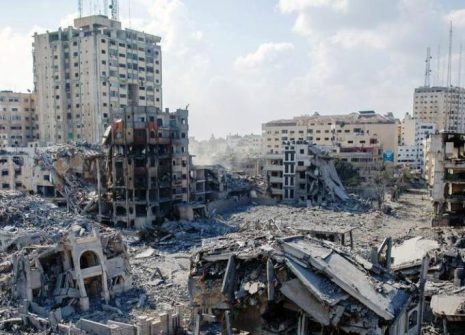
The Gaza Strip. Photo Who
A fourth bone of contention in the event of a ANC-MPC coalition is the Palestinian issue. The ANC but also the EFF and the MK-Party are staunch supporters of the Palestinian cause. The ANC has the support of the Muslim community but also of large portions of the rest of the population which consider that Israel’s policies remind of the apartheid regime, for its decision to file a case at the International Court of Justice accusing Israel of genocide and condemn its illegal occupation of Palestinian territories.
By contrast, the DA expressed steadfast support for Israel. Its shadow minister for international relations Emma Powell condemned “Hamas’ unprovoked attack on Israeli territory”. Although the DA voiced a more centrist rhetoric since then, expressing solidarity with both Palestinians and Israelis who seek a two-state solution, unlike the ANC it has refused so far to speak of a genocide in Gaza. But it is on the domestic front that the choice of the coalition partner will matter the most. The gap between the DA’s liberal policies and the EFF’s Marxist economic program of nationalization of mines, for instance, is simply enormous. (Open Photo: 123rf)
François Misser



